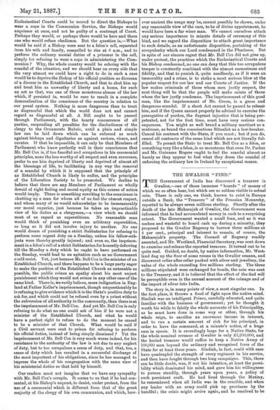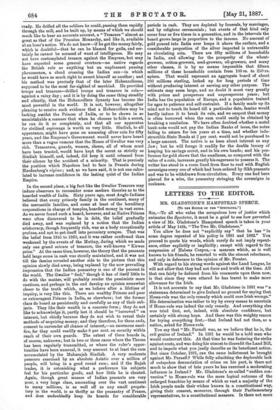THE GWALIOR " FIND."
THE Government of India has discovered a treasure in Gwalior,—one of those immense " hoards " of money of which we so often bear, but which are so seldom visible in actual coin. There is only one, we think, known to exist in Europe outside a Bank, the " Treasure " of the Prussian Monarchy, reported to be always seven millions sterling. Shortly after the death of the late Maharajah of Gwalior, the Government were informed that he had accumulated money in cash to a surprising extent. The Government wanted a small loan, and as it was useless and wasteful to hoard cash up during a minority, they proposed to the Gwalior Regency to borrow three millions at 4 per cent, principal and interest to remain, of course, the Maharajah's property. The Council of Regency readily assented, and Mr. Westland, Financial Secretary, was sent down to examine and release the reported treasure. It turned out to be quite real. Guided, no doubt, by native information, Mr. West- land dug up the floor of some rooms in the Gwalior zenana, and discovered cellar after cellar packed with silver and jewellery, the value of the whole exceeding five millions sterling. The three millions stipulated were exchanged for bonds, the coin was sent to the Treasury, and it is believed that the effect of the find will be perceptible even in the annual account of the coinage and of the import of silver into India.
The story is, in many points of view, a most singular one. In the first place, it throws a flood of light upon the native mind. Sindiah was an intelligent Prince, carefully educated, and quite familiar with the business of government; yet be thought it worth his while to falsify the whole accounts of his Principality, as he must have done in some way or other, through his whole reign, to sacrifice an enormous income in interest, and to run a certain amount of risk for his principal, in order to have the command, at a minute's notice, of a huge sum in specie. It is exceedingly large for a Native State, for the whole nominal revenue of Gwalior is only 21,200,000, and the buried treasure would suffice to keep a Native Army of 100,000 men beyond the ordinary and recognised force of the State for at least three years. Sindiah, in fact, could with ease have quadrupled the strength of every regiment in his service, and then have fought through two long campaigns. This, there can be little doubt, was, if not his intention, at least the possi- bility which dominated his mind, and gave him his willingness to pursue steadily, through years upon years, a policy of such persistent craft. He had lived through the Mutiny, he remembered when all India was in the crucible, and when any leader with an army could pick up provinces by the handful ; the crisis might arrive again, and he resolved to be
ready. He drilled all the soldiers he could, passing them rapidly through the mill, and he built up, by means of which we should much like to hear an accurate account, a " Treasure " almost as great as that of the Prussian Monarchy, and like it, available at an hour's notice. We do not know—if he got the money fairly, which is doubtful—that he can be blamed for guile, and cer- tainly he cannot be accused of want of intelligence. He may not have contemplated treason against the Empress, but may have expected some general overturn—no native regards the British rule as anything but an unpleasant passing phenomenon, a cloud crossing the Indian sun—in which he would have as much right to assert himself as another; and his method was precisely that of the later Hohenzollsrns, supposed to be the most far-sighted of mankind. He provided troops and treasure—drilled troops and treasure in coin— against a rainy day ; and it is by doing the same thing steadily and silently, that the Hohenzollern dynasty has become the most powerful in the world. It is not, however, altogether pleasing to receive such evidence that a Hohenzollern may be lurking amidst the Princes of India, or to be shown in so unmistakable a manner that when he chooses to hide a secret, he can do it so completely, and that all our apparatus for civilised espionage is worth so very little. Sindiali, to all appearance, might have gone on amassing silver coin for fifty years, and the Empress's Government would never have heard more than a vague rumour that the House of Gwalior was very rich. Treasurers, guards, women, slaves, all of whom must have been trusted, would have kept the secret as strictly as Sindiah himself, and, indeed, did keep it until released from their silence by the accident of a minority. That is precisely the position which Napoleon had to face in Prussia during Hardenberg's rlgime; and, as we have said, it is not one calcu- lated to increase confidence in the lasting quiet of the Indian Empire.
In the second place, a big fact like the Gwalior Treasure may induce observers to reconsider some modern theories as to the hoarded wealth of India. Sixty years ago, most Anglo-Indiana believed that every princely family in the continent, many of the mercantile families, and some at least of the hereditary corporations in charge of temples, hoarded money in vast sums. As we never found such a hoard, however, and as Native Princes were often discovered to be in debt, the belief gradually died away, and was replaced by a notion that the Indian aristocracy, though frequently rich, was as a body exceptionally profuse, and apt to get itself into pecuniary scrapes. That was the belief from 1845 to 1860, and it was rather confirmed than weakened by the events of the Mutiny, during which we made only one grand seizure of treasure, the well-known " Kirwee prize." At the same time, however, the theory that the peasants held large sums in cash was stoutly maintained, and it was not till the famine revealed another side to the picture that this opinion slowly died away, being replaced by the now prevailing impression that the Indian peasantry is one of the poorest in the world. The Gwalior " find," though it has of itself little to do with the matter, will probably render the pessimists more cautions, and perhaps in the end develop an opinion somewhat closer to the truth which, as we believe after a lifetime of inquiry, is very like this. There are wealthy Princes and poor or extravagant Princes in India, as elsewhere; but the former class do board as persistently and carefully as any of their sub- jects. They like their wealth in a concrete form ; they do not like to acknowledge it, partly lest it should be " borrowed " on interest, but chiefly because they do not wish to reveal their methods of acquiring money; and they therefore, for these ends, convent to surrender all chance of interest,—an enormous sacri- fice, for they could readily make 8 per cent. on security within reach of their own guards. The extent of these hoards is, of course, unknown; but in two or three cases where the Throne has been regularly transmitted, or where the ruler's oppor- tunities have been unusual, it may amount to at least the sum accumulated by the Maharajah Sindiali. A very moderate pressure exercised by an absolute Asiatic over a million of people, will bring in a good round sum; and if the Rajah trades, it is astonishing what a preference his subjects feel for his particular goods, and bow little he is cheated. Again, though great masses of Indian peasants are very poor, a very large class, amounting over the vast continent to many millions, is as well off as any small proprie- tary in the world, is as thrifty as the peasantry of France, and does undoubtedly keep its hoards for considerable
periods in cash. They are depleted by funerals, by marriages, and by religions ceremonials ; but events of that kind only occur four or five times in a generation, and in the intervals the hoard grows large in proportion to the income. No amount of gold poured into India ever keeps it above the surface, and a considerable proportion of the silver imported is untraceable as circulating coin. There are fifty millions of households in India, and allowing for the prosperity of the wheat- growers, cotton-growers, seed-growers, oil-growers, and many other classes, it is by no means impossible that fifteen millions of these households contain from 100 rs. to 250 rs. apiece. That would represent an aggregate hoard of about 200 millions sterling, locked up for long periods of time without producing interest or serving any other purpose. The estimate may seem large, and no doubt it must vary greatly with prices and prosperous and unprosperons years ; but India has the population of Europe, and a population trained for ages to patience and self-restraint. If a family made up its mind not to touch its hoard till a particular date, famine would hardly induce it to break its rule, and we suspect that money is often borrowed when the sum could easily be obtained by breaking a resolution. We have often doubted whether a metal bank-note would not pay the Indian Banks of issue, the notes failing to return for ten years at a time, and whether inde- structible State Bonds at 2 per cent. would not be purchased to a large amount. The native is as keen about interest as any Jew ; but he will forego it readily for the double luxury of keeping his savings secret, and in his own bands; and his pre- ference for gold shows that the smallness, as compared with the value of a coin, increases greatly his eagerness to possess it. The writer has stood in a room lined from floor to roof with English sovereigns every one of which had been ordered by Slh peasants and was to be withdrawn from circulation. Every one had been pierced for a wire, the peasantry stringing the sovereigns in rouleaus.



















































 Previous page
Previous page